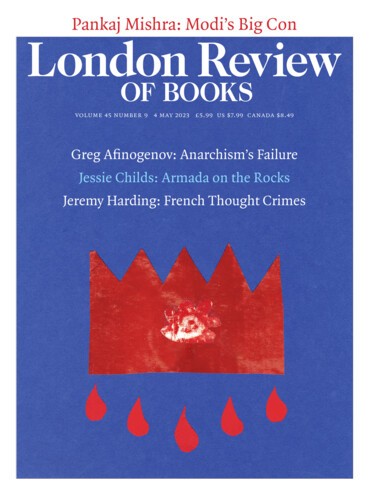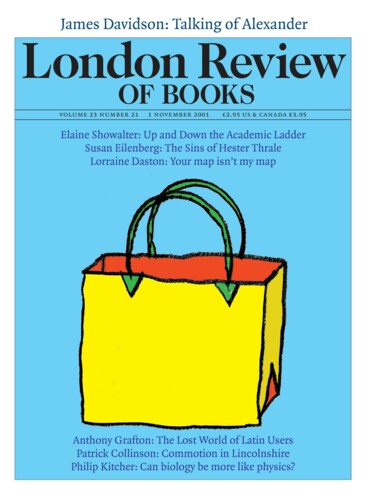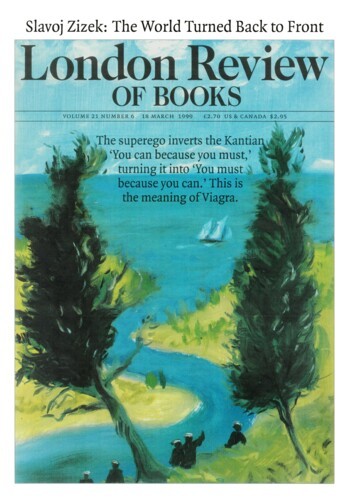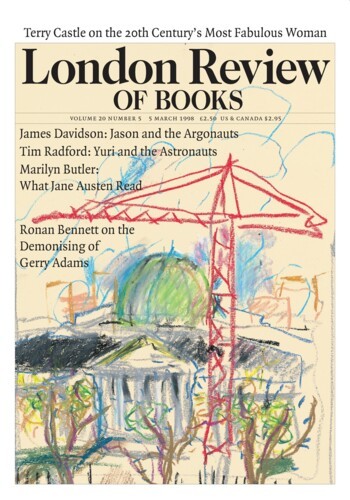Philip Kitcher
Philip Kitcher, a professor of philosophy at Columbia, is the author of Science, Truth and Democracy, among other books.
Not in my body, thank you: Kauffman’s ‘Investigations’
Philip Kitcher, 1 November 2001
In February 1943, Erwin Schrödinger delivered a series of three lectures in Dublin. A year later, they were published as a book, under the title What Is Life?, so ensuring that Schrödinger’s ideas reached an audience far larger than the four hundred – a number, he wryly notes, which ‘did not substantially dwindle’ over the three lectures – who...
Sea-shells and Tigers
Philip Kitcher, 18 March 1999
‘Each week I plot your equations dot for dot, xs against ys in all manner of algebraical relation, and every week they draw themselves as commonplace geometry, as if the world of forms were nothing but arcs and angles. God’s truth, Septimus, if there is an equation for a curve like a bell, there must be an equation for one like a bluebell, and if a bluebell, why not a rose?’ So says Lady Thomasina Coverly, the heroine of Tom Stoppard’s Arcadia, to her tutor Septimus Hodge. Her question was echoed a century after her (fictitious) life by the unorthodox biologist D’Arcy Wentworth Thompson, whose mathematical investigations of the living world were collected in On Growth and Form, published in 1917. Although they have excited the admiration of some important thinkers, including Alan Turing and the biologists John Tyler Bonner and Stephen Jay Gould, Thompson’s ideas do not figure prominently in the biological curriculum or the mainstream of research.‘
You win, I win: unselfish behaviour
Philip Kitcher, 15 October 1998
Organisms that contribute to the reproductive success of their species by doing things that decrease the size of their own brood appear to be inevitable losers in the Darwinian struggle. Since the 19th century, biologists have regarded the evolutionary possibility of altruism as an important theoretical puzzle, and in past decades, it has become clear that it can’t be solved by vague appeals to the idea that co-operative behaviour is good for the flock, the herd or the species. There are alternatives, however. If altruists direct their helpful behaviour towards relatives, then the genes associated with altruism may spread, because they are present in the beneficiaries and transmitted to their offspring; or if today’s altruist is tomorrow’s recipient, the present loss may be made up with interest. Models of kin selection and reciprocal altruism are widely regarded as solving the puzzle.
Tall, Slender, Straight and Intelligent: cloning and reprogenetics
Philip Kitcher, 5 March 1998
From the late seventies to the mid-Nineties, biological orthodoxy insisted that the artificial production of animals with an identical complement of nuclear genes – clones, in the vernacular – could only be achieved by means of the transfer of nuclei from embryonic cells, and then only in non-mammalian species. There were excellent grounds for insisting on the impossibility of cloning from adult cells. For, although virtually all the cells in a mature animal contain the same complement of genes, cellular differentiation, the process by which the cells of different systems and tissues take on their distinctive properties, modifies the nuclear DNA in such a way that some regions are effectively silenced. In consequence, nuclei from adult cells were not supposed to be able to direct normal embryonic growth – which accounted for the disappointing results of transplantation experiments using adult nuclei, i.e. the deaths of embryos at early stages.
Pieces about Philip Kitcher in the LRB
Quadruple Tremolo: Philosophy Then
Kieran Setiya, 4 May 2023
It’s difficult to argue that something is valuable in itself. But I’m not alone in finding the questions of pure philosophy both maddening and mesmerising.
Impossible Conception: ‘Death in Venice’
T.J. Reed, 25 September 2014
The double centenary in 2012 of the publication of Kafka’s The Judgment and Thomas Mann’s Death in Venice was marked only, to my knowledge, by a single conference, in California....
In the Long Cool Hour: Pragmatic Naturalism
Amia Srinivasan, 6 December 2012
‘These English psychologists,’ Nietzsche wrote in 1887, ‘just what do they want?’ You always find them at the same task, whether they want to or not, pushing the partie...
What Wotan Wants
Jerry Fodor, 5 August 2004
Wagner’s operas in general, and the Ring cycle in particular, have been goading the criticising classes into print for a century and a half, with still no end in sight, but the sacrifice of...
On the Necessity of Practising a Benign, or Utopian, Genetics
John Dupré, 14 November 1996
Scientists would sometimes like us to believe that science is just too difficult for the comprehension of ordinary mortals. Given the increasing diversity of specialities, moreover, there is no...
Read anywhere with the London Review of Books app, available now from the App Store for Apple devices, Google Play for Android devices and Amazon for your Kindle Fire.
Sign up to our newsletter
For highlights from the latest issue, our archive and the blog, as well as news, events and exclusive promotions.





